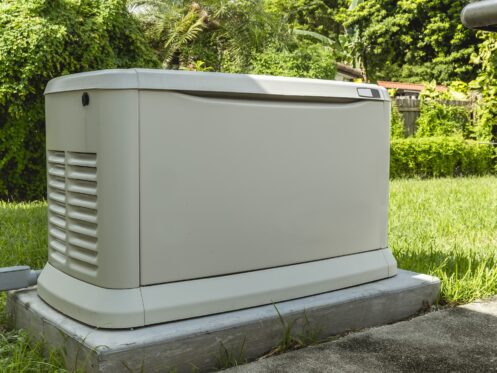Living in Washington means enjoying beautiful landscapes, experiencing diverse weather patterns, and having an ever-present need to prepare for unexpected power outages. Between windstorms, winter snow, and wildfire season, not to mention an aging power grid, blackouts can occur at any time with very little warning.
That’s the reason that a whole-house generator will become an essential part of your home’s infrastructure. These permanent systems don’t just power a lamp or a few appliances. They provide backup power to keep your household running when the rest of the neighborhood loses power. In this guide, we will help you understand how these systems work and the benefits they offer for your home.
What Is a Whole-House Generator?
A whole-house generator (also known as a standby generator) is permanently installed outside your home. This installation needs to be near your electrical panel. Unlike portable units, it connects directly to your system and runs using propane or natural gas. These systems automatically detect when your area loses power and activate within seconds to supply electricity to your home.
Once the electric company restores power, the generator shuts itself off and reconnects your home to the grid. The system automatically transfers power, giving you peace of mind that you’ll always have access to essentials. One of the significant advantages of having a whole-house generator is that there is no need to go outside in the rain or snow to start the unit manually. Let’s delve more deeply into the benefits that they offer.
Provides Reliable Power During Outages
Power outages in Washington often occur because of windstorms, falling trees, icy winter weather, or wildfires. Unlike regions with fewer natural hazards, homes like yours in Washington may lose power several times a year. Outages like this can sometimes last for hours or even days. In rural areas of Washington, where utility crews may take longer to respond, having a backup power source for your home is a necessity.
A whole-house generator kicks in automatically to keep lights, heating systems, appliances, and electronics running, ensuring a seamless and comfortable experience. There’s no disruption to your routine, even if the outage lasts through the night. It’s essential if your home relies on electric heat, sump pumps, or well water systems, all of which can stop functioning when the power goes out.
Supports Your Entire Home
While portable generators are useful in emergencies, they’re usually limited to powering just a few items. A whole-house generator, on the other hand, has the capacity to power your entire home.
That means your HVAC system, kitchen appliances, well pump, water heater, garage doors, home office equipment, and security system can continue operating without a hitch.
Whether you’re dealing with freezing winter temperatures or trying to keep your food from spoiling in the fridge, a whole-house generator delivers consistent coverage. This type of power support is beneficial during longer outages or when extreme weather conditions make it unsafe to leave your home.
Protects Appliances and Electronics
When the power flickers on and off, your appliances and electronics can suffer from voltage spikes. These surges may not always cause immediate damage, but over time, they can degrade wiring, wear out components, and shorten the lifespan of high-value equipment.
Whole-house generators include automatic voltage regulation, which stabilizes power flow during transitions. This helps protect sensitive systems, like computers, entertainment centers, home networks, and even smart thermostats. In areas where power outages may be short but frequent, this added layer of protection can save you from costly repairs and replacements.
Even though whole-house generators deliver clean, stable power, brief spikes can still occur during transitions. Installing a whole-home surge protector in addition to a standby generator creates a protective shield to safeguard your devices from these power fluctuations.
Keeps Home Heated During Cold Winter Storms
Bellingham winters are unpredictable. A single snowstorm or ice event can cause widespread outages, leaving homes without heat when it’s needed most. If your heating system relies on electricity, a blackout can quickly escalate into a hazardous situation.
A whole-house generator keeps your heating system running during prolonged outages. This is especially critical for seniors, families with young children, or anyone with medical conditions that make cold temperatures a health risk.
Enhances Home Value and Buyer Appeal
As this area continues to grow and more homebuyers are prioritizing energy resilience, a whole-house generator has become a highly desirable feature. It’s especially appealing when you expect seasonal outages and home office setups demand constant uptime.
Adding a generator to your home shows that you’ve invested in long-term reliability, safety, and convenience. For prospective buyers, it’s one less thing to worry about. It is also a major selling point if they’ve experienced long power outages in the past. Whether you’re planning to sell in the near future or you simply want to protect your investment, a standby generator increases your home’s value.
Provides Automatic Monitoring and Self-Maintenance
Today’s whole-house generators are smarter than they have ever been. Most models include automatic self-tests and remote monitoring capabilities. The system runs itself for a few minutes each week to ensure it’s ready for an emergency. Many whole-house generators can also alert you or your service provider if there’s an issue.
Some generators connect to your smartphone, so you can check on the system’s status while you’re at work or traveling. This hands-off approach to maintenance keeps the unit ready to go 24/7, without requiring constant attention from you. Regardless of whether this is your primary home, a second home, or a vacation home, this is a significant advantage for you, especially if you are busy.
Runs on Safe Fuels Sources
Standby generators utilize natural gas or propane, which offers cleaner, longer-lasting energy than gasoline. Natural gas connects directly to your utility line, allowing the system to operate continuously for as long as you need it. If natural gas isn’t available, a large propane tank provides days of continuous power with minimal refueling.
Unlike portable generators that may require multiple fuel top-offs, a standby generator runs automatically and safely in all weather conditions. That means no more fumbling with gas cans in the cold or worrying about fire hazards near your home.
Who Should Consider a Whole-House Generator?
If your home is prone to outages or is in an area where power restoration takes time, a standby generator provides peace of mind and security. It’s beneficial for:
- Homes in forested or high-elevation areas
- Homes relying on electric heating, sump pumps, or medical equipment
- Families working or learning remotely
- Vacation homes in remote areas
- Off-grid communities
Find Reliable Power When Washington Weather Strikes
It pays to prepare in a state known for diverse terrain and unpredictable conditions. A whole-house generator gives you full control during the power grid’s most uncertain moments. Whether it’s keeping your family warm or protecting your daily routines, the benefits are far-reaching.
If you’re ready for whole-house generator installation, contact our electrical services team at Marr's Heating, AC, Plumbing and Electrical. We understand the power needs of Bellingham residents like you and can set you up with a system that never leaves you in the dark again.



